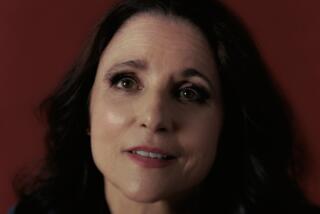Ida F. Davidoff; Family Therapist, Expert on Aging
- Share via
We do not grow old. We become old by not growing.
Ida Fisher Davidoff
*
She followed her own advice. When her four children grew up, she had “a lovely depression” about her empty nest, then went back to college to earn a doctorate--at age 57--in marital and family counseling.
When arthritis made it difficult to stoop over to tend her garden, she planted wildflowers in raised boxes. When her fingers got too stiff to play piano, she took singing lessons.
She saw patients until a few weeks ago, and still planned to write a book, titled “Age: A Work of Art,” using herself as her primary example.
Ida Fisher Davidoff died May 11 in New Canaan, Conn., where until recently she had baked her own bread, swum nude in her pool, and was “always thinking ahead.” She was 97.
Davidoff became a lecturer and expert on aging by aging well. She was interviewed on national television programs and for Betty Friedan’s 1993 book “The Fountain of Age.”
One advantage of age, Davidoff told Friedan, is that “the older you get, the more you get to be like yourself.”
She knew that from personal experience, adding, “I have gained tremendously more self-confidence, even in the last four or five years, become more integrated as a person now, more together.”
Yet she had no illusions about the vagaries of old age, describing her health as “superb, considering,” and telling one interviewer, “If after 65 you wake up well without any pain or quake, you’re dead.”
Friedman quoted the nonagenarian’s frank comment, “I am constantly aware that I am living on borrowed time.”
And yet, Davidoff added in the next breath, “I live as if I’m going to live a long time. I’m planting bulbs, putting in shrubs that will take years to grow. Why deprive yourself of even an hour of beauty because you don’t know how long you’ll be around to enjoy it?”
Abhorring ageism, Davidoff advised her audiences to create their own image of what aging should be, as well as to exercise, watch their nutrition and nurture friendships. Laughter was another good component of happy aging, she said, never failing to prompt knowing chuckles with her observation that “there are four categories of life: babyhood, childhood, middle age and ‘You look wonderful.’ ”
Davidoff saw nothing unusual about her resolve to “make my own image as an older person” because she had always viewed herself as a pioneer, a rebel of sorts, battling stereotypes.
Born in a poor Jewish section of Boston to Lithuanian immigrants, she was told by her father, “Girls don’t go to college.” But she earned a bachelor’s degree at Boston’s Simmons College and a master’s at Radcliffe.
She met her husband, Dr. Leo Davidoff, one of the founders of the Albert Einstein College of Medicine of Yeshiva University, when she invited him to speak to a Radcliffe group about his recent expedition to the North Pole. After three dates, the two were engaged.
For a couple of decades, she became a happy housewife and mother. But when her youngest turned 10, she “looked ahead,” going to Yale, the University of Pennsylvania and eventually Columbia University for training to legitimize what her friends seemed to think she already knew a lot about--marital and family counseling.
She hung out her shingle in New Canaan even before she received the doctorate. That was the mid-1950s and, as she said, “the beginning of family therapy.”
Davidoff, widowed for a quarter-century, is survived by her son, Frank; daughters Helen Hirsch, Leonore Davidoff and Mary Houts; seven grandchildren; and nine great-grandchildren.
More to Read
Sign up for Essential California
The most important California stories and recommendations in your inbox every morning.
You may occasionally receive promotional content from the Los Angeles Times.













